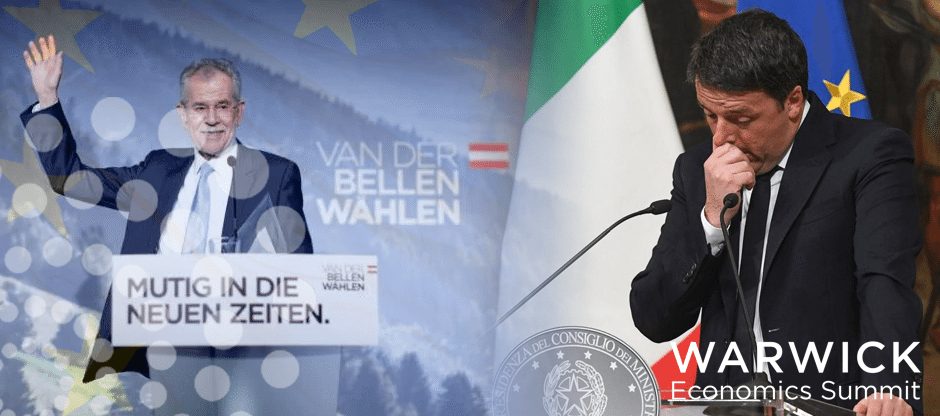WES: Italy and Austria, diverging prospects
With the Austrian general election and Italian constitutional referendum now behind us, we turn our attention to the impact these two events will likely have on the ever-threatened process of globalisation and attempt to understand the shocking divergence in voting patterns.
As we glance back at the year drawing to a close, it becomes apparent that 2016 has constituted a series of the nerve-wrecking political votes. More importantly, the results of these votes indicate that the year has brought on a significant rightward, populist shift in the global political arena. Hence, last week’s two major voting events served as the barometer measurements of the populist moods in Europe. However, as Sunday came, a surprising divide in the voting behaviour of these two nations emerged, with the anti-establishment movement triumphing in Italy but conceding defeat in Austria.
Italy’s constitutional vote concerned Matteo Renzi’s will to streamline the country’s political system by reducing senators and trimming the sluggish law-making process – measures that would have provided a healthy jolt to the economy amidst 16 years of stagnation. Nevertheless, the ‘No’ vote of the referendum was championed by two right-wing populist parties: The Five Star Movement and the Northern League. With Renzi tying his career to the outcome, the referendum morphed into a test of Italy’s political establishment. It culminated late on Sunday with a blow to the system and Renzi’s resignation. Nevertheless, the populist outcome of the constitutional referendum in Italy was countered by the Austria’s presidential election. Sunday afternoon saw Austria’s left-leaning Alexander Van der Bellen vanquish his far-right opponent Norbert Hofer with 53.8% of votes.
How could one explain this stark divergence in voting behaviour? It is fair to say that much of the global right-wing surge can be traced back to the refugee crisis. It unleashed explosive disagreement over responsibility distribution and the EU’s attempts to enforce refugee quotas. It is not a coincidence that the migrant crisis coincided with the sudden rise of anti-establishment, globalisation-countering, Eurosceptic parties around the world. The driving forces behind these movements appeared to be the apolitical, nearly comical figures (see Italy’s Beppe Grillo, Boris Johnson, and Trump) who availed themselves to the social media and exploited the crisis-inflicted sentiment of anger at globalisation and xenophobia in order to establish their populist camps.
Thus, an explanation for Italy and Austria’s political divergence could lay on the former’s Mediterranean location which has exposed it to a much harsher role in the refugee crisis and amplified right-wing sentiment. On the other hand, Renzi’s failure to maintain his post is not entirely attributable to issues of left versus far-right politics. His reforms were also opposed by the establishment figures such as Mario Monti (former PM) who worried that the emasculation on the senate would pool too much power in Renzi’s hands.
Alternatively, the fact that Austrian and Italian economies are also in contrasting states could explain why the anti-establishment movement is bound to be stronger in Italy than in Austria. Italy comes second after Greece in terms of economic stagnation following the 2008 crisis. Thus, the electorate’s frustration at the prolonged circumstances of depression and lack of opportunity render them much more susceptible to radical politics which promise to break from the unfruitful economic situation.
Though Van der Bellen’s triumph plants optimism, the threat of Europe’s first far-right head of the state since the World War Two still looms oppressively. When Italian elections are called, it is conceivable that Grillo’s M5S could claim power. The same goes for Dutch, French and German elections, all of which take place in early 2017 and see the Freedom party, Front National, and AFD, respectively, gaining support at worrying rates.
By Maike Kusserow
This piece is part of Warwick Economics Summit’s #WESWednesday blog series. The Boar Finance section is WES’ official student media partner for the academic year 2016/2017. You can view the original piece and other blog posts here.

Comments